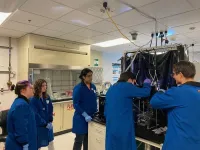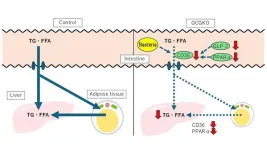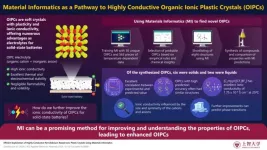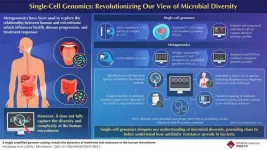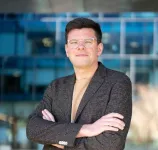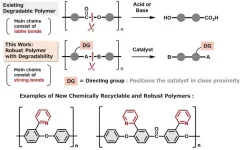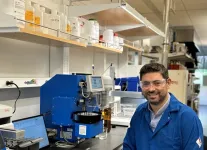Jefferson Lab physicists named APS Fellows
The American Physical Society has named four Jefferson Lab staff members as new APS Fellows for 2024
2024-10-07
(Press-News.org) NEWPORT NEWS, VA – Four physicists affiliated with the U.S. Department of Energy’s Thomas Jefferson National Accelerator Facility have been selected by their peers for the distinct honor of Fellow of the American Physical Society.
“Our staff power the science and innovation that are continuing to move the discipline of physics and this laboratory into the future,” said Jefferson Lab Director Kim Sawyer. “We’re very proud that the accomplishments and contributions of these four Jefferson Lab staff members to the field of physics are being recognized by their peers with this honor.”
According to the APS, fellows have made exceptional contributions to physics. This year’s four Jefferson Lab honorees have contributed to innovative particle accelerator design, to world-leading research on particles made of quarks, to adding to our knowledge of both protons and neutrons, to particle detector developments, and to visionary scientific and program leadership.
Jefferson Lab’s newly selected APS Fellows for 2024 include:
S. Alex Bogacz
For the development of a broadly adopted novel coupling formalism for accelerators, its application to innovative recirculating linac designs, and leadership in high-energy recirculating linac design for ERLs, muon colliders, and CEBAF upgrades.
Jozef J. Dudek, jointly appointed with William & Mary
For contributions to the spectroscopy of hadrons under the strong nuclear force and their impact on experimental programs worldwide.
Mark Kevin Jones
For scientific leadership in experimental studies of the fundamental nucleon electromagnetic form factors, including the surprising discovery of significant variation in the large momentum behavior of the proton electric form factor, and for developing new detection systems enabling the studies
Patrizia Rossi
For leading a scientific program to study the nucleon’s transverse momentum dependent parton distribution functions, including the development of a major particle detection system, and for visionary leadership in promoting the science of an energy-upgraded CEBAF accelerator at 22 GeV beam energy.
The APS announced its 2024 Fellows on Oct. 4. These newly minted fellows join the ranks of an elite cadre of physicists employed in academia, national laboratories and industry worldwide. The APS has more than 50,000 members, and each year, no more than one half of one percent of APS membership may be elected to fellowship status. Click here for the full list of APS Fellows.
-end-
Jefferson Science Associates, LLC, manages and operates the Thomas Jefferson National Accelerator Facility, or Jefferson Lab, for the U.S. Department of Energy's Office of Science. JSA is a wholly owned subsidiary of the Southeastern Universities Research Association, Inc. (SURA).
DOE’s Office of Science is the single largest supporter of basic research in the physical sciences in the United States and is working to address some of the most pressing challenges of our time. For more information, visit https://energy.gov/science
END
[Attachments] See images for this press release:
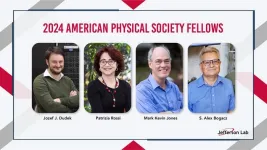
ELSE PRESS RELEASES FROM THIS DATE:
2024-10-07
COLUMBUS, Ohio – Psychiatric drugs are reported to be about 50% more effective in clinical trials funded by the drug’s manufacturer than when trials of the same drug are sponsored by other groups, new research shows.
While many studies have found more favorable results for drugs in clinical trials funded by their manufacturers, these studies normally just compare a set of manufacturer-funded studies with a set of studies funded in other ways, said Tamar Oostrom, assistant professor of economics at The Ohio State University, who conducted this new research.
This ...
2024-10-07
UTSA was selected by the U.S. Department of Energy’s (DOE) Office of Nuclear Energy (NE) to lead a multimillion-dollar project that will stimulate nuclear energy research at UTSA, leverage novel experimental data to bolster computational efforts at the university, and provide professional training to prepare undergraduate and graduate students for careers in nuclear energy science. UTSA researchers will collaborate with a leading nuclear energy laboratory as well as across academic institutions.
The award is part of the DOE’s Nuclear Energy University Program’s Integrated Research Projects (IRPs). These projects aim to provide research and development solutions ...
2024-10-07
The accumulation of fats in the liver is driven by high-fat diets and obesity, and is becoming an increasingly prevalent global health concern. Characterized by excessive fat accumulation in the liver, this condition poses significant risks for various metabolic disorders. While much of the existing research has focused on fat metabolism within the liver itself, emerging findings emphasize the critical role of the gut in this complex process. Proglucagon-derived peptides (PGDPs), including glucagon, GLP-1, and GLP-2, are known to be the key hormones that regulate lipid metabolism in the liver. Derived from the same precursor—proglucagon, previous studies ...
2024-10-07
The surge in the adoption of renewable energy, coupled with the rapid growth of the electric vehicle market in recent years has significantly increased the demand for high-performance, all-solid-state batteries. Compared to conventional liquid electrolyte-based batteries, solid-state batteries offer higher energy density, improved safety, longer lifespan, and reliable operation over a wide temperature range. However, there are still challenges to their widespread applications, including low ionic conductivity, high interfacial resistance, and the presence of particle-particle interfaces in the electrolyte, which leads to increased resistance and lower energy density.
Notably, ...
2024-10-07
The human microbiome plays a critical role in our health, influencing everything from disease development to treatment responses. This connection has captured the attention of scientists worldwide, eager to unlock its secrets. While traditional metagenomics has provided valuable insights, it falls short in resolving microbial diversity at the strain level and accurately profiling genes involved in antibiotic resistance. These limitations highlight the need for more advanced approaches.
To address this, a team of researchers led by Associate Professor Masahito Hosokawa, from Waseda University, in collaboration with bitBiome, Inc., developed a groundbreaking single-cell ...
2024-10-07
The winner of one of the UK’s biggest academic prizes has discovered what he believes is the key to long-term innovation and economic growth: unplanned intellectual friendships – like Greek philosophers Plato and Aristotle, or DNA pioneers James Watson and Francis Crick.
Professor Kirk Doran, an Associate Professor of Economics at the University of Notre Dame in Indiana in the United States, has been researching what drives innovation for 14 years – and has made his discovery by forensically analysing data including published research and census, tax, migration and historical data.
Professor Doran has ...
2024-10-07
Australians under 50 are experiencing stagnating life expectancy while older cohorts, especially men, are living longer, according to new research from The Australian National University (ANU).
The study examined longevity trends and patterns in six English-speaking countries (Australia, Canada, Ireland, New Zealand, the United Kingdom and the United States) and compared them with other high-income countries.
The results show striking similarities between English-speaking countries in terms of adverse health outcomes for young and middle-aged adults under fifty.
Lead author and ANU demographer, Dr Sergey Timonin, said the study ...
2024-10-07
Osaka, Japan – Plastics underpin much of modern life—areas like medicine, technology, and food safety would be unrecognizable without plastics and their useful properties. However, the toughness of plastics, which is often desirable, also makes them a dangerous pollutant and difficult to recycle. The solution to this serious and growing problem is making plastics easier to recycle.
In a study recently published in Chemical Science, researchers at Osaka University have found a way to make tough, high-performance polymers, the main component of plastics, that can be broken down easily and precisely into their component parts and ...
2024-10-07
Tobacco use remains a significant global health challenge, despite extensive control measures at both national and international levels. Smoking continues to be a leading cause of premature death, with exposure to tobacco—whether through active smoking or secondhand smoke—significantly increasing the risk of non-communicable diseases (NCDs) such as cardiovascular disease, cancer, chronic respiratory conditions, and diabetes. These NCDs account for nearly 75% of annual global deaths.
A wide range of strategies has been developed to combat smoking and promote public health, including taxation, mass media campaigns, health warnings on packaging, marketing ...
2024-10-07
Targeting failure with new polymer technology to enhance sustainability
Sustainability is a complex problem with many different players and influenced by policies, society, and technical perspective.
We are reminded every day in the media of the unnecessary amount of waste that we are generating with pervasive pictures of plastic garbage patches floating in the oceans or stranded on our beaches.
Scientists within ASU’s School of Molecular Sciences (SMS) and the Biodesign Institute’s Center ...
LAST 30 PRESS RELEASES:
[Press-News.org] Jefferson Lab physicists named APS Fellows
The American Physical Society has named four Jefferson Lab staff members as new APS Fellows for 2024

